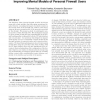Free Online Productivity Tools
i2Speak
i2Symbol
i2OCR
iTex2Img
iWeb2Print
iWeb2Shot
i2Type
iPdf2Split
iPdf2Merge
i2Bopomofo
i2Arabic
i2Style
i2Image
i2PDF
iLatex2Rtf
Sci2ools
104
click to vote
SOUPS
2009
ACM
2009
ACM
Revealing hidden context: improving mental models of personal firewall users
The Windows Vista personal firewall provides its diverse users with a basic interface that hides many operational details. However, concealing the impact of network context on the security state of the firewall may result in users developing an incorrect mental model of the protection provided by the firewall. We present a study of participants’ mental models of Vista Firewall (VF). We investigated changes to those mental models and their understanding of the firewall’s settings after working with both the VF basic interface and our prototype. Our prototype was designed to support development of a more contextually complete mental model through inclusion of network location and connection information. We found that participants produced richer mental models after using the prototype than when working with the VF basic interface; they were also significantly more accurate in their understanding of the configuration of the firewall. Based on our results, we discuss methods of...
| Added | 28 May 2010 |
| Updated | 28 May 2010 |
| Type | Conference |
| Year | 2009 |
| Where | SOUPS |
| Authors | Fahimeh Raja, Kirstie Hawkey, Konstantin Beznosov |
Comments (0)

